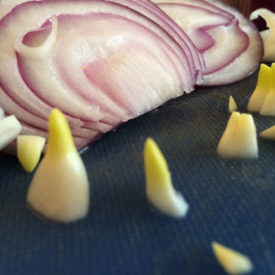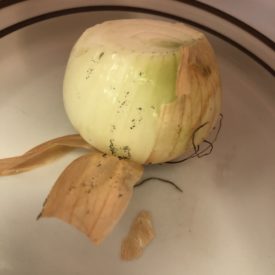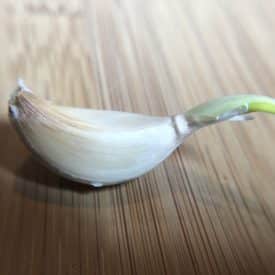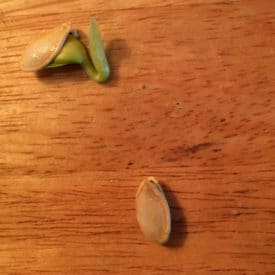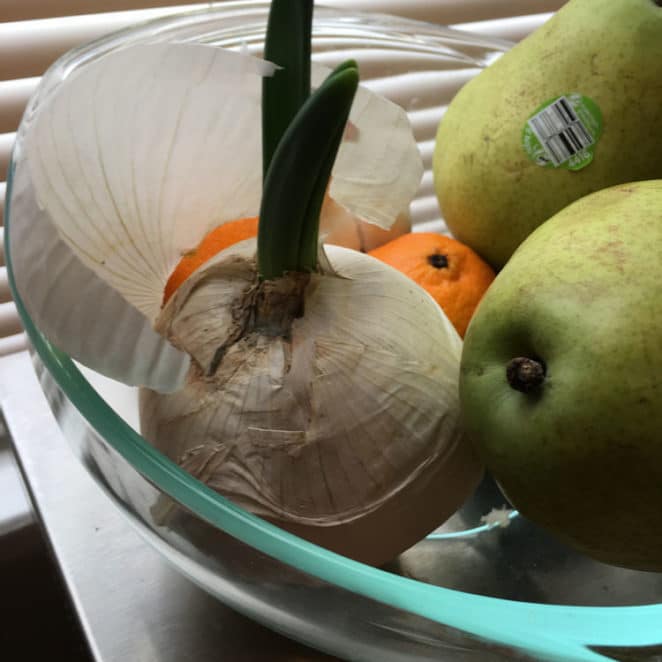
What you see: A sprouted onion.
What it is: A sprouted onion!
Eat or toss: Eat! You can eat the onion and its green shoots too! But, if the onion sprouted a long, long time ago the onion will be visibly depleted and may even smell. It will be obvious that it’s not good to eat.
Are sprouted onions safe to eat?
First off, thanks to Susan M. of Norwalk, Conn. for sending this photo of her very sprouted white onion!
Fortunately for Susan and the stew she was hoping to make, sprouted onions—including the sprouts themselves like those pictured above—are entirely safe to eat. The worst that could happen is the onion could taste more bitter normal. Onion sprouts, unlike potato sprouts, do not present any kind of hazard.
When onions sprout, some of their good stuff, especially sugars, is directed to the new growth. With many of its sugars beamed up to the growing shoots, the onion bulb itself loses sweetness and moisture. You may or may not mind the more bitter taste or texture. You also may not notice anything off at all, especially if you cook the onion.
What can you do with onions that have sprouted?
Cook them! To be on the safe side, try a dish where onions play a supporting, rather than starring role.
Does a sprout impact an onion’s taste? Opinions vary
Views on the culinary viability of sprouted onions vary: Cook’s Illustrated ran a taste test with sprouted and not-sprouted onions and found that the sprouted onions tended to be less sweet and more fibrous (because of moisture loss, a common affliction of older veggies). But, writing for TheKitchn, Sheela Prakash reports detecting no bitterness, even in the sprouts themselves, when the onions are cooked.
You CAN eat the sprouts on sprouted onions
So, yes you certainly can eat the sprouts themselves. Prakash is obviously down for it. Cook’s Illustrated’s taste testers, however, didn’t like the green shoots, finding them too bitter. The Waste Free Kitchen Handbook also encourages eating the onion and its sprouts as well, suggesting you use the sprouts as you would a green onion.
Here at EatOrToss, we’re all about reducing food waste, so we’d urge you to give them a try. Tell us what you think!
But, before you start chopping, a few words on avoiding this situation in the first place.
How to prevent onions from sprouting
Onions sprout because they get cues that it’s time to move on to the next stage in their life cycle; age, hormones and temperature are all involved. In fact, some onions are treated with maleic hydrazide, a “plant growth regulator,” to inhibit sprouting.
A too-warm environment can spur an onion into shoot-growing. A too-humid environment will cause onions to go bad sooner. Ideally, store onions in a cool, dry, dark pantry with lots of ventilation. According to the National Onion Association, you can refrigerate to extend the shelf life of sweet or mild onions, but you must use a low-moisture setting.
What should you do when you find a sprouted onion?
As soon as an onion has sprouted, consider it a message from Onionville that it’s time to get cooking. If you let a sprout advance too much, the onion will get depleted and may start rotting (signs of decay include squishy texture and a bad, maybe musty odor–put those onions in your compost). If the onion’s schedule is out of synch with your meal plan for the week, not to worry. You can freeze freshly chopped onions. No need to cook or blanche them first.
Is your garlic sprouting? Both garlic and onions are part of the allium genus and sprout in similar circumstances. You may also be interested in our posts about sprouting potatoes, sprouting sweet potatoes, sprouting tomatoes and sprouting squash.
SOURCES:
- Waste Free Kitchen Handbook. Dana Gunders. p. 165
- So Your Garlic (and Onion) Grew a Sprout. Can You Still Use It? Sheela Prakash. TheKitchn.
- Using Sprouted Onions: Is it OK to cook with sprouted onions? Cook’s Illustrated. September 2013.
- Onions – Mid-Atlantic Commercial Vegetable Production Recommendations. Gerald (Jerry) Brust. University of Maryland Extension. Updated: March 12, 2021.
- Harvesting and Storing Onions. Iowa State University Extension and Outreach. Richard Jauron. Extension Horticulturalist.
- Role of Ethylene on Sprouting of Onion Bulbs (Allium cepa L.). Benkeblia, N.* and Selselet-Attou, G. (Institute of Biology, Mostaganem University, BP 118, 27000 Mostaganem, Algeria). Acta Agriculturæ Scandinavica Section B, Soil and Plant Science. 1999. Onions, Dry. Vegetable Produce Facts. Postharvest Center. University of California, Davis. Trevor Suslow, Department of Plant Sciences.
- Post-Harvest Cooling and Handling of Onions. North Carolina State Extension.
- How To’s. National Onion Association.
The incrEDIBLE onion!
Updated January 2024

